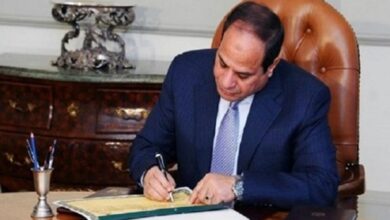Egyptian election observers said Saturday there was no letup in harassment of opposition candidates on the eve of parliamentary elections, which critics say are little more than a tool for tightening the government's grip and burying dissent.
The observers themselves are under pressure – only 10 percent of those who applied were granted permits to watch the voting at polling stations and those who got them will be under tight restrictions, said rights activist Bahey-eldin Hassan.
For the government of 82-year-old President Hosni Mubarak, Sunday's elections are a chance to roll back the opposition bloc in parliament and silence opponents – especially the fundamentalist Muslim Brotherhood. For weeks, police and armed gangs have broken up Brotherhood campaign events in a show of force that sets the stage for next year's presidential election.
For Egyptians – very few of whom turn out to vote – there is little belief that the elections will improve their lives, which have been made more toilsome by poverty, rising food prices, low wages and unemployment.
Over the weekend, authorities arrested 22 more members of the Muslim Brotherhood, a banned group that nonetheless remains Egypt's largest and best organized rival to Mubarak's ruling National Democratic Party. Running as independents, Brotherhood members won a fifth of the seats in the 2005 vote. The ruling party is aiming to prevent that this time around.
Overall, security forces rounded up nearly 1,400 of its supporters in recent weeks, the Brotherhood said.
Past elections in Egypt have been beset by vote rigging in favor of the ruling party, according to human rights groups. In the 2005 election, police closed off entire polling stations to ensure opposition voters could not get in, sparking riots at some sites that left at least 10 people dead.
The government, which insists the elections will be fair, has barred international observers as an infringement of its sovereignty. Local monitors will be allowed to enter polling stations to watch voting, but they are barred from questioning election officials or voters.
However, many opposition candidates seeking to register representatives to observe Sunday's voting say they've had their applications denied outright.
Hassan, the rights activist who is in charge of one group of observers, said the days leading up to the vote clearly demonstrated the security agencies are in control of the election process – and not the government-appointed Election Commission.
Election Commission officials were quoted in local media as saying 6,000 observers were given permits. Hassan said most of those observers were pro-government.
Sobhi Saleh, a Muslim Brotherhood lawmaker and candidate in Alexandria, said his representatives won't be allowed to observe the voting despite a court ruling in their favor.
"So we will go early in the morning and we will demand our right for a representative inside the (polling) station, and we will be faced with violence, but we will not be afraid and we will not give up. We will sacrifice ourselves for this right."
Hassan said authorities have also ignored a Supreme Court ruling requiring the reinstatement of disqualified opposition candidates.
"There is a lot of chaos in organizing these elections. The authorities are nervous," he said. Ignoring the court decision "makes the new parliament's legitimacy questionable."
In their crackdown, authorities have also reined in the media, shutting several independent TV stations and forcing critics off the air on other channels.
In one victory for the opposition on Saturday, an administrative court ordered the lifting of restrictions on the mass distribution of text messages – a key tool activists use to mobilize supporters. But it was not clear if the ruling would be implemented in time for the elections.
The ruling party has also used judicial avenues to battle its rivals.
Mohammed Kamal, a senior National Democratic Party member, said the party filed a complaint with the country's prosecutor to revoke the candidacy of 52 Brotherhood members because they belong to an illegal organization.
"They have a unified slogan, a unified program and they claim to be independent. They are not really independents," Kamal said. "You can't continue to mix politics and religion. This is not only just illegal but it is also dangerous."
It was the first time authorities have challenged the right of the Brotherhood to field candidates as independents, something they have done for years.
On Thursday, 12 Muslim Brotherhood supporters were sentenced to two years in jail for hanging campaign posters on a government building in Alexandria, a member of the group said. A court official said the decision was based on the group's use of a religious slogan, which is barred.




